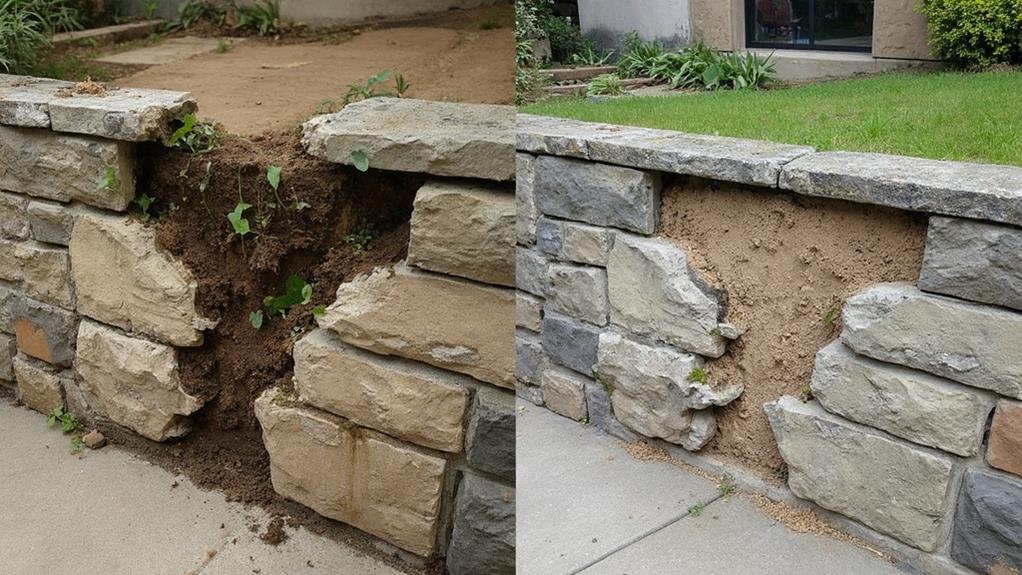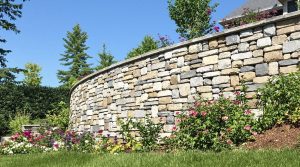Hiring a professional for retaining wall repairs guarantees a thorough approach to addressing structural issues. Experts possess in-depth knowledge of engineering principles, soil mechanics, and drainage systems, enabling precise problem identification and tailored solutions. Their specialized equipment and efficient workflows lead to time and cost savings, while adherence to safety standards and local regulations provides liability protection. Professionals can enhance the wall's longevity through customized designs, appropriate material selection, and effective drainage integration. Their expertise in erosion control and surface water management contributes to long-term stability. By leveraging bulk purchasing power and accurate estimations, contractors offer cost-effective solutions that minimize future maintenance needs. Further exploration reveals additional benefits of professional retaining wall repairs.
Table of Contents
ToggleWalls Contractor Highlights
- Professionals possess specialized knowledge and tools for accurate problem diagnosis and effective repairs.
- Hiring experts saves time and money through efficient workflows and access to quality materials at competitive prices.
- Professional repairs ensure compliance with local building codes and provide liability protection for property owners.
- Contractors offer customized solutions that address immediate concerns and enhance long-term durability of retaining walls.
- Expert repairs are more cost-effective in the long run, reducing the need for frequent maintenance or replacement.
Structure Supporting Soil Pressure
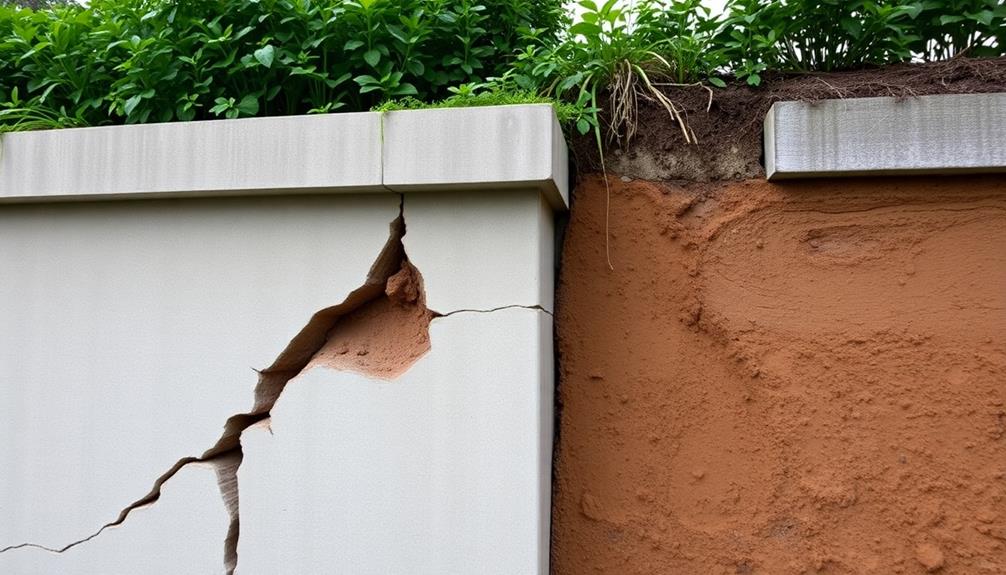
Retaining wall repairs necessitate a thorough understanding of soil pressure dynamics, which involve intricate calculations accounting for factors such as soil type, moisture content, and surcharge loads. This is why hiring a company like Granite Company can be beneficial, as they specialize in retaining walls and have over 20 years of experience.
The structural integrity of the wall hinges on the careful selection of materials that can withstand the calculated pressures, requiring engineers to examine the strength properties of concrete, steel reinforcement, and other components. Integral to the wall's longevity and performance is the incorporation of an effective drainage system, which alleviates hydrostatic pressure and prevents water accumulation that could compromise the wall's stability over time.
Soil Pressure Calculation Complexities
Calculating soil pressure on retaining walls presents significant challenges due to the complex interplay of various factors. Professional engineers employ sophisticated methods to accurately assess these pressures, considering elements such as soil composition, groundwater levels, and surcharge loads. The intricate nature of these calculations requires extensive knowledge of geotechnical principles and structural mechanics.
To illustrate the complexity involved, consider the following aspects:
- Soil type variations and their unique properties
- Dynamic loads from seismic activity or nearby traffic
- Hydrostatic pressure from saturated soil conditions
- Frost heave effects in colder climates
- Time-dependent changes in soil characteristics
Comprehending these intricacies is essential for homeowners and property managers seeking to maintain the integrity of their retaining walls. By entrusting repairs to qualified professionals, you confirm that all relevant factors are meticulously evaluated and addressed. This thorough approach not only guarantees the longevity of your retaining wall but also safeguards your property from potential hazards associated with structural failure. Engaging experts in this field demonstrates a commitment to responsible property management and community safety, aligning with best practices in construction and engineering.
Material Strength Considerations
When evaluating the structural integrity of a retaining wall, material strength plays a pivotal role in its ability to withstand soil pressure. Different materials, such as concrete, stone, or timber, possess unique characteristics that determine their suitability for specific retaining wall applications. A professional engineer possesses the expertise to assess these material properties and select the optimal choice for your particular situation.
Concrete, for instance, offers exceptional compressive strength but may require reinforcement to resist tensile forces. Stone walls, while aesthetically pleasing, demand precise construction techniques to guarantee stability. Timber, though cost-effective, necessitates careful consideration of decay resistance and structural longevity. The intricate interplay between material properties, soil conditions, and design parameters requires a nuanced understanding that only seasoned professionals can provide.
They can accurately calculate load-bearing capacities, factor in environmental stressors, and determine appropriate safety margins. By entrusting your retaining wall repairs to a qualified expert, you ensure that the chosen materials will effectively support the soil pressure, mitigate potential risks, and provide long-term stability for your property.
Drainage System Integration
Proper drainage system integration stands out as a critical component in retaining wall repairs. Professional contractors possess the expertise to assess existing drainage conditions and implement appropriate solutions to prevent water accumulation behind the wall. This process involves careful planning and execution to guarantee long-term stability and functionality of the retaining structure.
By addressing drainage issues, professionals mitigate the risk of hydrostatic pressure buildup, which can lead to wall failure, soil erosion, and property damage.
A thorough drainage system typically includes:
- Perforated drainage pipes installed behind the wall
- Properly graded backfill material to facilitate water flow
- Geotextile fabric to prevent soil infiltration into drainage components
- Weep holes or outlets for water discharge
- Surface water management techniques to divert runoff
Integrating these elements requires a comprehensive understanding of soil mechanics, hydrology, and construction techniques. Professional contractors utilize their knowledge to create customized drainage solutions tailored to each unique site condition. By entrusting your retaining wall repairs to experienced professionals, you ensure that drainage issues are addressed thoroughly, safeguarding your investment and providing peace of mind. Their expertise not only extends the lifespan of your retaining wall but also protects your property from potential water-related damages.
Benefits
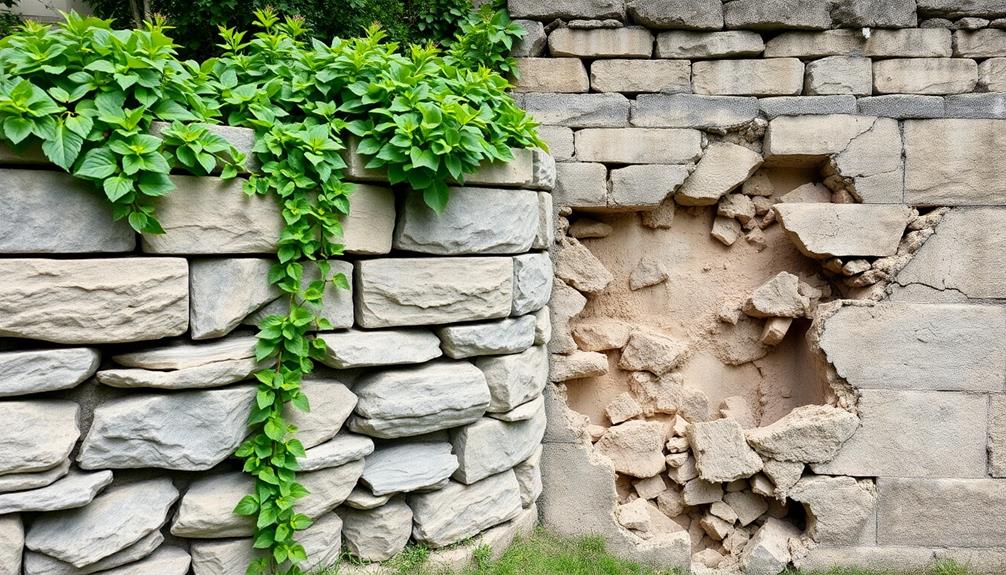
Professional retaining wall repairs offer numerous benefits that extend beyond simply fixing structural issues. Engaging experts with specialized knowledge in this field can lead to significant time and cost savings because they have access to custom design solutions tailored to the specific needs of your retaining wall.
Additionally, their ability to efficiently diagnose problems and implement effective solutions guarantees the stability and durability of the structure. Moreover, professional repairs safeguard safety and liability protection, while utilizing quality materials and workmanship to enhance the longevity and performance of the retaining wall.
Expertise and Specialized Knowledge
Expert knowledge and specialized skills are invaluable assets when it comes to retaining wall repairs. Professional contractors possess an exhaustive understanding of structural engineering principles, soil mechanics, and drainage systems essential for ensuring the longevity and stability of retaining walls. Their expertise enables them to accurately assess the underlying causes of wall failures, develop tailored solutions, and implement effective repair strategies that address both immediate concerns and long-term durability.
Hiring a professional for retaining wall repairs offers numerous advantages:
- Access to advanced diagnostic tools and techniques for precise problem identification
- In-depth knowledge of local building codes and permit requirements
- Ability to recognize potential complications and mitigate risks during the repair process
- Expertise in selecting appropriate materials and construction methods for ideal results
- Comprehensive understanding of water management and erosion control techniques
Time and Cost Savings
While the expertise of professionals is invaluable, the time and cost savings associated with hiring experts for retaining wall repairs are equally compelling. Homeowners who attempt DIY repairs often underestimate the complexity and time requirements of such projects, leading to extended timelines and potential mistakes that can be costly to rectify.
Professional contractors, with their specialized equipment and efficient workflows, can complete repairs in a fraction of the time it would take an inexperienced individual. Moreover, professionals have established relationships with suppliers, allowing them to source high-quality materials at competitive prices. This procurement advantage, combined with their ability to accurately estimate material needs, minimizes waste and unnecessary expenses.
Additionally, professional repairs are typically more durable and long-lasting, reducing the likelihood of frequent maintenance or premature replacement. This longevity translates to significant cost savings over time.
Safety and Liability Protection
Safety considerations are paramount when undertaking retaining wall repairs, making professional intervention a prudent choice for homeowners. Engaging a qualified expert not only guarantees the structural integrity of the wall but also mitigates potential risks associated with improper repair techniques.
Professional contractors possess the requisite knowledge of local building codes, soil mechanics, and drainage systems, enabling them to address underlying issues that may compromise the wall's stability.
By entrusting the repair process to professionals, homeowners safeguard themselves against liability concerns that may arise from substandard workmanship or accidents during construction. Certified contractors carry all-encompassing insurance coverage, providing an additional layer of protection for property owners.
Additionally, their expertise in identifying and rectifying potential hazards contributes to the long-term safety of the surrounding landscape and structures.
Consider the following benefits of professional retaining wall repairs:
- Compliance with local building regulations and safety standards
- Utilization of appropriate equipment and safety protocols
- Proper assessment of soil conditions and drainage requirements
- Implementation of reinforcement techniques to prevent future failures
- Provision of warranties and guarantees for completed work
Ultimately, investing in professional retaining wall repairs demonstrates a commitment to the safety and well-being of your property and community.
Quality Materials and Workmanship
The benefits of quality materials and workmanship in retaining wall repairs cannot be overstated. Professional contractors possess the expertise to select and utilize superior materials that withstand the test of time and environmental pressures. These materials, coupled with skilled craftsmanship, guarantee the longevity and structural integrity of your retaining wall, protecting your property investment for years to come.
Experienced professionals understand the nuanced requirements of different soil types, drainage patterns, and load-bearing capacities. They meticulously assess these factors to determine the most appropriate materials and construction techniques for your specific situation. This tailored approach results in a retaining wall that not only meets but exceeds industry standards, providing you with peace of mind and a sense of belonging to a community of responsible property owners.
Furthermore, quality workmanship extends beyond mere aesthetics. It encompasses precise engineering calculations, proper reinforcement techniques, and meticulous attention to detail during the construction process. By entrusting your retaining wall repairs to seasoned professionals, you're investing in a solution that seamlessly integrates with your landscape while offering unparalleled structural support and durability.
Drainage System Maintenance Requirements
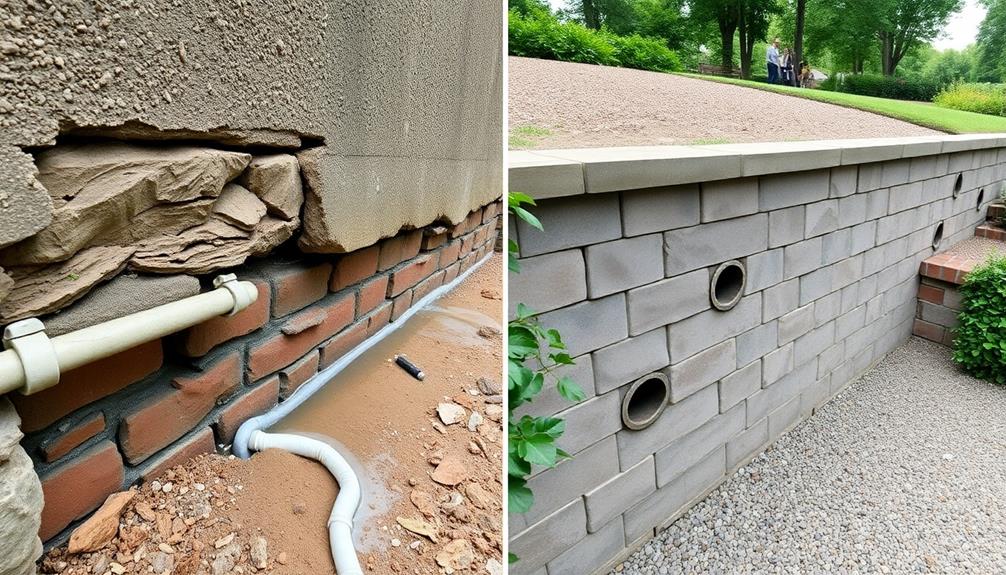
Maintaining the drainage system of a retaining wall is pivotal for its longevity and structural integrity. Proper water flow management involves ensuring that weep holes and drainage pipes remain unobstructed, while implementing clogging prevention techniques such as installing filter fabrics and regularly clearing debris. Regular inspections are indispensable to identify potential issues early, allowing for timely interventions that can prevent costly repairs and structural failures.
| Maintenance Task | Frequency | Tools Required |
|---|---|---|
| Clear debris | Monthly | Rake, pressure washer |
| Inspect drainage pipes | Quarterly | Flashlight, camera |
| Replace filter fabric | Annually | Shovel, new fabric |
Proper Water Flow Management
Behind every successful retaining wall lies an effective drainage system. Proper water flow management is indispensable for maintaining the integrity and longevity of your retaining wall structure.
Professional contractors understand the intricate balance between soil pressure, hydrostatic forces, and structural stability. They employ advanced techniques to guarantee water is efficiently directed away from the wall, preventing erosion, soil saturation, and potential structural damage.
Effective water flow management involves:
- Installing and maintaining a thorough drainage network
- Implementing proper grading and surface water diversion techniques
- Utilizing geotextile fabrics to prevent soil infiltration into drainage systems
- Incorporating weep holes and drainage pipes at strategic locations
- Regular inspection and cleaning of drainage components
Clogging Prevention Techniques
Silt, debris, and organic matter pose constant threats to the efficiency of retaining wall drainage systems. Without proper maintenance, these elements can accumulate over time, potentially leading to clogged pipes and compromised drainage performance. To mitigate these risks, professional retaining wall repair services implement a range of clogging prevention techniques designed to ensure the longevity and effectiveness of your drainage system.
One pivotal aspect of maintaining ideal drainage is the regular inspection and cleaning of weep holes, which allow water to escape from behind the wall. Professionals utilize specialized tools and techniques to clear these openings, preventing the buildup of sediment and plant material. Additionally, they may install filter fabric or gravel filters to trap larger particles before they enter the drainage system.
Periodic flushing of drainage pipes with high-pressure water jets can also help dislodge accumulated debris and maintain proper water flow. In some cases, the installation of catch basins or sediment traps at strategic points in the drainage system can facilitate easier removal of collected material during routine maintenance. By entrusting these critical tasks to experienced professionals, property owners can guarantee their retaining wall's drainage system remains functional and effective for years to come.
Regular Inspection Importance
While preventive measures are essential, the cornerstone of effective drainage system maintenance lies in regular inspections. Professional retaining wall experts possess the expertise to conduct thorough examinations, identifying potential issues before they escalate into costly repairs.
These inspections encompass a comprehensive evaluation of the wall's structural integrity, drainage components, and surrounding soil conditions. By implementing a routine inspection schedule, property owners can guarantee the longevity and functionality of their retaining walls, safeguarding their investments and preventing potential hazards.
Regular inspections offer numerous benefits for retaining wall maintenance:
- Early detection of minor issues, preventing major structural failures
- Assessment of drainage system efficiency and functionality
- Identification of soil erosion or settlement concerns
- Evaluation of vegetation growth that may impact wall stability
- Documentation of wall condition for future reference and maintenance planning
Engaging a professional for these inspections provides property owners with peace of mind and access to expert recommendations. These specialists can offer tailored solutions to address any identified issues, ensuring the retaining wall continues to perform its critical function effectively. By prioritizing regular inspections, property owners demonstrate a commitment to responsible maintenance practices, protecting both their assets and the safety of those in the vicinity.
Walls Contractor FAQ
How Long Does a Typical Retaining Wall Repair Project Take?
The duration of a typical retaining wall repair project can vary considerably depending on the wall's size, damage extent, and complexity. Generally, small-scale repairs may take a few days, while larger projects could span several weeks to complete.
What Materials Are Commonly Used for Retaining Wall Repairs?
Common materials for retaining wall repairs include concrete, stone, brick, and treated timber. Reinforcing steel, geotextile fabric, and drainage materials are often used as well. These options provide durability and strength, ensuring your wall's longevity and stability.
Can I Repair Small Cracks in My Retaining Wall Myself?
While minor cracks can be addressed by DIY enthusiasts, it's vital to assess the underlying cause first. For our community's safety, consider consulting a professional to guarantee proper repair techniques and prevent future structural issues in our shared spaces.
How Often Should Retaining Walls Be Inspected for Potential Issues?
Regular inspections of retaining walls are essential for our community's safety. Experts recommend annual checks, with additional inspections after severe weather events. By staying vigilant, we can identify potential issues early and guarantee our walls remain structurally sound.
Are There Any Eco-Friendly Options for Retaining Wall Repairs?
Yes, eco-friendly retaining wall repair options exist for our environmentally-conscious community. We can use recycled materials, native plants for soil stabilization, and permeable materials to improve drainage. These sustainable solutions benefit both our walls and the planet we share.

